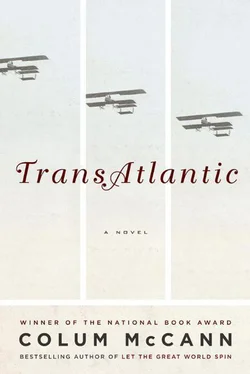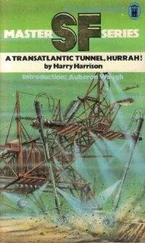IT IS AS if, in a myth, he has visited an empty grain silo. In the beginning he stood at the bottom in the resounding dark. Several figures gathered at the very top of the silo. They peered down, shaded their eyes, began to drop their pieces of grain upon him: words. A small rain at first. Full of vanity and history and rancor. Clattering in the emptiness. He stood and let it sound metallic around him, until it began to pour, and the grain took on a different sound, and he had to reach up and keep knocking the words aside just to get a little space to breathe. Dust and chaff in the air all around him. From their very own fields. They were pouring down their winnowed bitterness, and in his silence he just kept thrashing, spluttering, pushing the words away. A refusal to drown. What nobody noticed, not even himself, was that the grain kept rising, and the silo filled, but he kept rising with it, and the sounds grew different, word upon word, falling around him, building beneath him. And now — at the top of the silo — he has clawed himself up and dusted himself off and he stands there equal with the pourers who are astounded by the language that lies below them. They glance at each other. Three ways down from the silo. They can fall into the grain and drown, they can jump off the edge and abandon it, or they can learn to sow it very slowly at their feet.
A RUMOR OF morning hangs faint on the sky. He wears his thick gray overcoat, his scarf, a plain wool hat. He does not wear a flat one for fear he will appear partisan. The confounded demands of peace. He drives towards Stormont, taps Gerald on the shoulder just as they pull in.
— You sure, Senator?
He sees security men scurry into position the moment he gets out. The cold stings his cheeks. The dawn holds the prospect of rain. He leaves the car door slightly open, just in case. The men and women are ranged around barrels, warming their hands. They raise their heads at the sight of him. They have gathered so many candles, burning all night. Against the wall, rows and rows of flowers. How is it possible to speak of the dead? He has imagined the troubles of these people. A sort of ghosthood. How many nights have they sat outside these gates, waiting? Shopkeepers. Plumbers. Musicians. Butchers. Tinsmiths. Professors. Their blights and difficulties. He is at home amongst them. A teenage girl with a shine of sadness in her eye. A man pulling down the shabby hood of his coat to speak. Aye, Senator. What about ye? Frosty enough for ye, hai? Reporters jostling their way through the crowd. A Muslim woman in a headscarf: even she with an Irish desire. A longing spreading through the raw cold. Murmurs moving amongst them.
At the edge of the crowd, he stops. He is not quite sure if it is she or not. Her face in the distance. He peeks over a row of shoulders. The movement of the crowd. The sway. At the edge of the barricades. In a wheelchair. Wrapped in a couple of blankets. He gently parts the crowd and moves towards her.
— Morning.
— Hello, Senator.
Her name, briefly, escapes him. From Stranmillis. Lost her grandson.
— No tennis today?
— Thought I’d come for the final set.
— Oh, well, we hope it’s that, he says.
— Game and set, anyway, Senator.
— So far.
— Make it happen for us, she says, and she pauses a moment: Please.
He nods. The plaid blanket pulled up to her neck. Ninety years old at least. How can she possibly be out in such weather? It strikes him how easy it is to say yes, yes, he will make it work, he will do everything in his power to make it work. But it is out of his hands now. It does not belong to him: it is the property of others.
— Thanks for coming out, Lottie.
— Good luck, Senator.
— Thank you.
— Senator. My daughter. Hannah. Have you met her?
— Yes, of course.
A younger version of Lottie, really. Late fifties or sixties. An energy to her, a flair.
— We can’t thank you enough, Senator, says Lottie.
— It’s nothing, he says.
— Oh, it’s something, it surely is.
Lottie turns in her chair, pulls off her glove, and extends her hand towards him and says: You don’t know what this means, Senator.
— I’ll do what I can.
He is guided back towards the car and for some odd reason — he is not sure why — he slides into the front seat beside Gerald and he puts his hand on the dashboard as if this is a border to cross, a place he will not come back from. The car eases through the gates and the barrier is pulled down behind him. You don’t know what this means . Perhaps she is correct — he has spent all this time not truly knowing what it means. Now, it means everything. He will see this through now. To the bitter end. He will not back down. He hears another shouting behind him, a chant, and the bash of a lambeg drum.
He is dropped off in front of the building. He tells Gerald to go home and get some rest, but he knows full well that his driver will remain in the parking lot, the seat of the car extended backwards, the radio clicked on, steam from the heat gathering on the windscreen, turning and squirming in the small space.
Up the steps he goes, into the drab office block. A heaviness in the corridors. He walks along, shaking hands, touching shoulders. He knows every single one of their names. They are polite, deferent — scared, too. If they are to own it, they are also the ones to lose it. A valuable thing. Once in a thousand years. Peace.
He takes the stairs to the third floor. The stairwells reek of cigarette smoke. In his office he cracks open his window.
News comes later in the morning. A murder in Derry. A member of the paramilitaries. The statements are out. The press releases. The men of violence. Pointless retaliation. Trevor Deeney. Sitting in a car beside his wife. Shot point-blank. For what reason? Is there ever a reason? There will be retaliation. Already promised. This murder, too, is retaliation. Murder the murderers. Deeney’s brother opened fire in a bar called The Rising Sun. No end to the ironies. He leans his forehead against the desk. Strapped to a wheel, we shall not break.
Si vis pacem .
He reaches for the phone. We cannot let this happen, he says. We must make a sharp statement. Draw a line. Show no fear.
Para bellum .
He walks from office to office. Works on the press release. They are all in agreement: nothing will derail us now. We have come too far. Enough is enough. No surrender. We own that dictum now. It is ours. No. Surrender.
Later the news reaches him that Bertie Ahern’s mother, in Dublin, has died. Still, the Taoiseach will arrive by helicopter later tomorrow. Blair, too, will arrive with his convoy. The power brokers. The figureheads. The men who have inherited it. All of them will be in one place. In the one building. Primed. There is talk of a thousand journalists now, too. A thousand. It stuns him. From all corners of the globe. He must coordinate it now, this endgame. No matter what. He sits at his desk, uncaps his fountain pen. There can be no discussion of a pause or break. I intend to tell the parties that I won’t even consider such a request. There’s not going to be a break, not for a week, not for a day, not for an hour. We’ll either get an agreement or we’ll fail to get an agreement .
He cracks the window further. A sea-wind. All those ships out there. All those generations that left. Seven hundred years of history. We prefigure our futures by imagining our pasts. To go back and forth. Across the waters. The past, the present, the elusive future. A nation. Everything constantly shifted by the present. The taut elastic of time. Even violence breaks. Even that. Sometimes violently. You don’t know what this means, Senator.
For the next two days he will hardly sleep, hardly eat. No hotels even. He refuses to leave the office. He will sleep at his desk. He will wash at the hand basin in the small bathroom. Run the water. Tap the soap dispenser. Wash his hands thoroughly, methodically. Splash water on the back of his neck. Walk back along the corridor. Meet with Hume and Trimble. Listen carefully to their every word. Good men, both. The linchpins of the process. And he will spend hours on the phone with Clinton. Examining the very minutiae of the process. The dream of it all. The parade of footsteps along the corridor. Draft and redraft. He will beg the civil servants not to leak the documents. He will stand at the photocopy machine himself. Just to guard the memos. He will even number the copies. Walk up and down the stairs. From the canteen to his office, and back. Visitor after visitor. Party leaders. Representatives. Diplomats. Civil servants. He will feel as if he has had the same conversation a dozen times, two dozen. He will catch himself in midtalk, wondering if he has said this same thing just seconds before. A flush of blood to his cheeks. An embarrassment. Searching for new ways to say the exact same thing. He will listen for a riot, another murder, a bomb blast. On the radio. The television. At the gates even. None will come. Just the constant knocking on his door. Trays of sandwiches. Pots of tea. He will hear the sirens roar out the window. The cheers and the booing. The letters slipped in under the door. The whispered moan of prayers. The uneaten trays of food. Claire Curtain. Lottie Tuttle. Sheila Whelan. All the bits and pieces of his days. His desire for sleep nearly as powerful as his desire for peace. He should call her. Has he called her? Her voice. His breath. Andrew. Sleep.
Читать дальше












